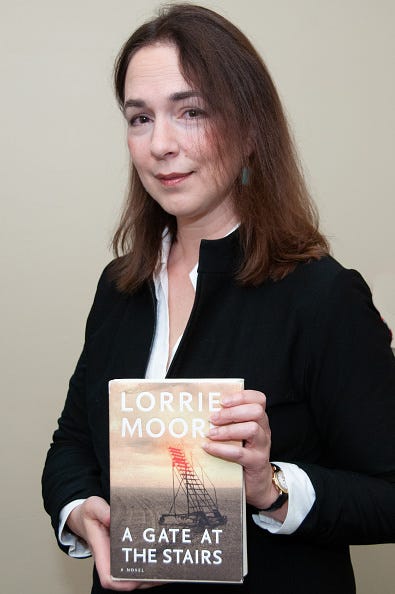The Writer's Almanac from Monday, January 13, 2014
The Writer's Almanac from Monday, January 13, 2014
"Polly Perkins" by Harry Clifton. Public domain.
ORIGINAL TEXT AND AUDIO - 2014
It's the birthday of Lorrie Moore (1957), born Marie Lorena Moore in Glens Falls, New York. She said of her childhood: "There was acting, and dressing up. We'd play music, and write crappy songs. We'd draw and paint, and fancy ourselves as artistic. It was part of being a girl in the '60s that you were creative." She won a short-story prize from Seventeen magazine when she was 19 years old, which prompted her to send them everything she'd ever written. She said, "They couldn't get rid of me. I was like a stalker. I sent them everything, and of course they didn't want anything more from me." It was only after she told her parents about her publication that she found out they had both wanted to be writers themselves. Her father went up into the attic and brought down stories that he'd once submitted to The New Yorker, and her mother admitted that she'd given up journalism for nursing.
She published her first book, a collection of stories that she'd written in graduate school at Cornell, when she was 28. That book was Self-Help (1985), a book Moore later said has "too many birds and moons, and space aliens, and struggling artists of every stripe, as well as much illness and divorce and other sad facts of family and romantic life." But the book was received well, and she was compared to everyone from Grace Paley to Woody Allen. She published two novels after Self-Help: Anagrams (1986) and Who Will Run the Frog Hospital (1994); as well as some short story collections, including Birds of America (1998).
Her most recent book is 2009's A Gate at the Stairs; it was her first book in 11 years, and her first novel in 15. She was busy in the intervening years, even if she wasn't writing. "I was teaching. I got divorced (in 2001). I was a single parent raising my kid alone. Look out in the world, find a woman who is teaching, is single, raising a kid and writing books and book reviews. When you find that person, I want to drink her blood."
Today is the birthday of Horatio Alger Jr., born in Chelsea, Massachusetts (1832). He was the oldest of five kids, and he was nearsighted and asthmatic. He was accepted to Harvard when he was 16, and he said, "No period of my life has been one of such unmixed happiness as the four years which have been spent within college walls." He studied under Henry Wadsworth Longfellow, was named Class Poet, and wrote essays, poetry, and short sketches. After graduation, he didn't enjoy much publishing success, so he made his living by taking a series of temporary teaching jobs.
He moved to New York City, and began working with homeless and delinquent boys, establishing boarding houses and securing homes and public assistance for them. It was during this time that he started writing dime novels for boys. It was his book Ragged Dick; or, Street Life in New York with the Boot-Blacks (1868) that finally made him a literary success. Inspired by the street boys he worked with, he had found a formula that he would return to again and again: a young boy, living in poverty, manages to find success and happiness by working hard and never giving up. His books had a powerful influence on America's self-concept as a land of rags-to-riches success stories. If you worked hard, and lived virtuously, and had a combination of "pluck and luck," as Alger said, you could go from the gutter to the mansion.
His popularity waned near the end of the century, as boys' tastes changed. He tried to keep up by making his books more violent, but his income dried up, and he died in near-poverty in 1899. At his request, his sister Augusta burned all of his personal correspondence. Historians have only gradually been able to reconstruct the story of his life.
Be well, do good work, and keep in touch.®




Horatio Alger's story has a seamier side: "Thanks to later biographers, Alger’s life story has become clearer. He was the son of a minister in Chelsea, Massachusetts, and his early interest in writing led him to study classics at Harvard University. Later, following in his father’s footsteps, he became a minister. However, after he was accused of sexually abusing boys in his parish, he was forced out of the church. His father convinced church leaders to keep quiet and promised Alger would never work in the clergy again. Alger moved to New York City and began writing prolifically." (see The New Encyclopedia of American Scandal by George C. Kohn)